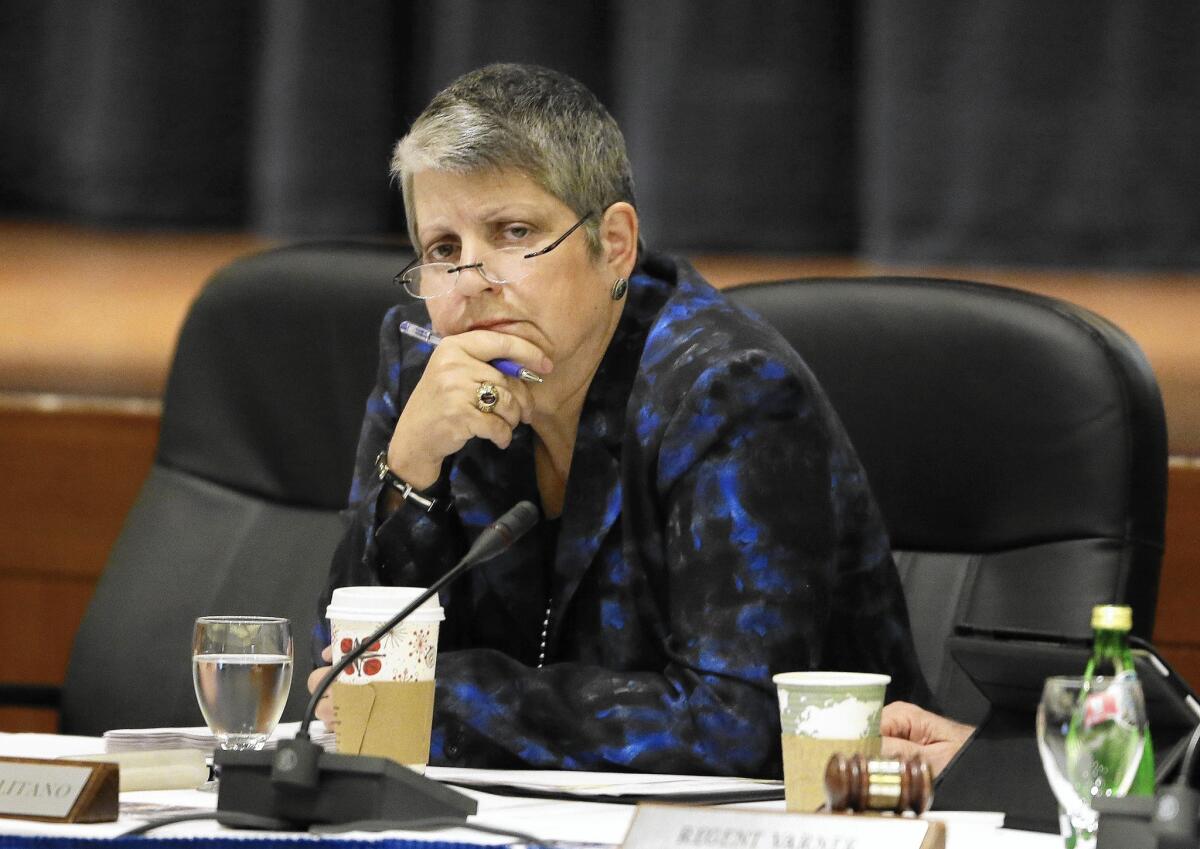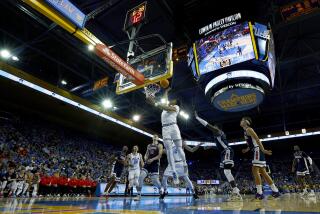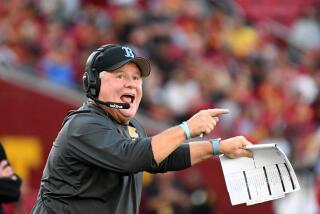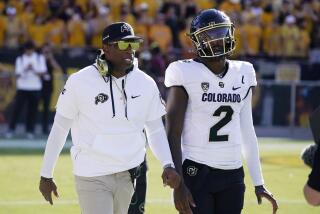UC coaches’ financial bonuses may be tied to athletes’ grades

Coaches are among the most highly-paid employees in the University of California system, with hefty bonuses if their teams have good seasons and win championships.
On Wednesday, UC officials debated how to add another factor to coaches’ compensation — and it has nothing to do with how well their teams perform. The university is moving to link student athletes’ grades and graduation rates to the bonuses that coaches can receive.
But some UC regents said the bar was being set too low.
Only a few of the contracts for coaches of the 120-plus eligible UC teams now include potential bonuses based on the academic achievements of team members on athletic scholarships. UC President Janet Napolitano wanted to widen that to include all varsity teams, and she appointed a task force to develop standards for teams’ academic success along with incentives and sanctions for coaches if they are not met.
The panel and Napolitano recently adopted the same complicated point system and minimum standards that the NCAA requires for teams to compete in championships. They include how many athletes stay in school and graduate within six years.
The task force said that new coaches and those whose contracts were up for renewal would be denied all bonuses, even those for championships, if teams’ academic averages did not meet the NCAA levels.
But several regents Wednesday noted that all UC teams except one — UC Riverside’s men’s basketball squad — already had grades and graduation rates above those levels, in many cases much higher. They asked whether UC’s minimums should be set higher to goad teams and ensure that athletes do as well in history and chemistry, for example, as they do in swimming and baseball.
Lt. Gov. Gavin Newsom, a regent, said that regents should “set a more ambitious direction for the University of California and ensure that these students receive a solid education in addition to their athletic experience.”
Regent John A. Perez, the former Assembly speaker, said he wanted to ensure that teams’ athletic success did not come “at the expense of their academic success.”
Task force members and athletic officials said the standards were meant as a minimum and that the nine undergraduate campuses could adopt higher ones. They say the new incentives could have a significant financial effect on coaches.
UCLA’s head football coach, Jim Mora, for example, will be paid about $3.2 million this year and could earn $930,000 more in bonuses depending on the team’s record, among other things. If his contract was new or up for renewal, those bonuses could in theory be at risk under the new policy.
Most coaching salaries come from television rights, ticket sales and other non-state revenue, officials said.
The discussion will continue Thursday. Some regents also are upset about a proposal to allow swifter approval of coaches’ hiring and contracts without the usual review of big-ticket salaries by the full board of regents; the plan calls for the regents to delegate most authority in that area to Napolitano and the chairman of the regents’ compensation committee.
Athletic directors say they fear losing good recruits if contracts need to wait for a vote by regents. But some regents resent what they see as a move to reduce their responsibilities.
In other matters, the UC regents on Wednesday authorized an unusual advisory panel to study the university’s finances and appointed two powerful people as its only members: Gov. Jerry Brown and Napolitano.
The two, both regents, are expected to hold their first meeting Monday in private and have several more sessions over the next few months, looking at such things as the cost of faculty salaries and pensions and whether more online classes could reduce spending.
Some regents expressed hope that the result would be a budget compromise between the governor and Napolitano, who are arguing over UC’s plan to raise tuition by as much as 5% over each of the next five years.
Brown, who first suggested the study in November, quipped Wednesday that he could not guarantee unanimous opinions on the committee but noted that “we won’t have any more than two opinions, and that’s good.”
He took pains to say that committee reports would be advisory and preliminary and that the full board of regents retained “ultimate authority” over UC policies and budgets.
Napolitano promised to consult frequently with faculty, who have formal control over curriculum issues and have expressed concern about potentially being left out of important decisions.
UC officials say the Brown-Napolitano study sessions can remain closed to the media and public since the committee is advisory and is small enough to be exempt from open public meeting requirements. Staff from both sides will assist in the inquiry, and outside experts may testify.
Regent Sherry Lansing was among those who predicted the leaders could break the budget deadlock. They are “going to have a really robust discussion, and I believe they are going to come to a conclusion that is very, very beneficial for us,” she said.
Brown has proposed increasing state revenue for UC by $120 million, or 4%, next year, but only if tuition remains frozen for a fourth consecutive year. Napolitano says UC needs $100 million on top of that for such costs as pensions and salaries.
The regents have authorized her to increase undergraduate tuition by as much as $612 in 2015-16, to $12,804, excluding room and board, if state funding does not increase enough.
larry.gordon@latimes.com
Twitter: @larrygordonlat
More to Read
Start your day right
Sign up for Essential California for news, features and recommendations from the L.A. Times and beyond in your inbox six days a week.
You may occasionally receive promotional content from the Los Angeles Times.







